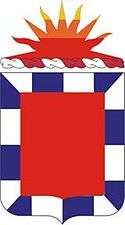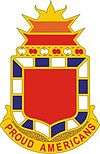32nd Field Artillery Regiment
| U.S. Field Artillery Regiments | |
|---|---|
| Previous | Next |
| 31st Field Artillery | 33rd Field Artillery |
The 32nd Field Artillery Regiment is a field artillery regiment of the United States Army, first Constituted in 1918.
Lineage
Constituted in the Regular Army as the 32nd Field Artillery and assigned to the 11th Infantry Division (United States) 5 July 1918.
Distinctive unit insignia
- Description
A gold color metal and enamel device 1 3/16 inches 3.02 cm) in height consisting of the shield, crest and motto of the coat of arms.
- Symbolism
The shield is red for Artillery. The bordure is in the colors of the corps distinguishing flag to indicate Corps Artillery. The crest represents the West Coast, the present assignment of the regiment; and inasmuch as a demi-sun also has the appearance of a rising sun it may also represent the origin of the organization on the East Coast.
- Background
The distinctive unit insignia was originally approved for the 32nd Field Artillery, Regular Army Inactive on 9 July 1937. It was redesignated for the 32nd Field Artillery Battalion on 2 January 1941. It was amended to change the motto on 7 May 1941. It was redesignated for the 32nd Artillery Regiment on 30 April 1958. It was amended to correct the description on 18 June 1958. It was amended to correct the unit designation from Regiment to Battalion on 20 February 1959. It was redesignated for the 32nd Artillery Regiment on 24 July 1959. The insignia was redesignated effective 1 September 1971, for the 32d Field Artillery Regiment.
Coat of arms
Blazon
- Shield
Gules, a bordure compony Argent and Azure.
- Crest
On a wreath of the colors Argent and Gules a demi-sun in splendor triparted barwise Or, Tenné and Gules. Motto PROUD AMERICANS.
- Symbolism
- Shield
The shield is red for Artillery. The bordure is in the colors of the corps distinguishing flag to indicate Corps Artillery. Crest The crest represents the West Coast, the present assignment of the regiment; and inasmuch as a demi-sun also has the appearance of a rising sun it may also represent the origin of the organization on the East Coast.
- Background
The coat of arms was originally approved for the 32nd Field Artillery, Regular Army Inactive on 9 July 1937. It was redesignated for the 32nd Field Artillery Battalion on 11 January 1941. It was amended to change the motto on 7 May 1941. It was redesignated for the 32nd Artillery Regiment on 30 April 1958. It was amended to correct the unit designation from Regiment to Battalion on 20 February 1959. It was redesignated for the 32nd Artillery Regiment on 24 July 1959. The insignia was redesignated effective 1 September 1971, for the 32d Field Artillery Regiment.
Battalions
The regiment consists of six battalions.
1st Battalion
The 1st Battalion 32nd Field Artillery Regiment "Proud Americans" was a Lance Missile battalion garrisoned at Fliegerhorst Kaserne in the Erlensee area of Hanau, West Germany from 1960 when it was activated as an Honest John unit. 1st Battalion later became a Lance battalion about 1976 through 1992 when it became part of 3rd Armored Division, VII Corps and returned to Fort Sill to become a Multiple Launch Rocket System (MLRS) unit which it remains today. 1/32 FA consisted of 5 Batteries: Alpha, Bravo, Charlie, Headquarters, and Service Batteries, and was deactivated in 1992 as a Lance Missile unit and reactivated as a Multiple Launch Rocket System (MLRS) unit. The unit patch worn was the 41st FA Brigade which was under V Corps Artillery until August 1991 when it joined 3rd Armored Division (Spearhead) and adopted its patch before returning to Fort Sill in 1992 to become a MLRS battalion.
2nd Battalion
The 2nd Battalion 32nd Field Artillery Regiment, the "Proud Americans", has existed, off and on, since 1918. It has participated in World War II, Vietnam, and the current War on Terrorism.
Pre-World War II
Organized at Camp Meade, Maryland, in 1918, the 32nd Field Artillery Regiment was in training at the end of World War I. Inactivated without deploying, the battalion remained inactive until October 1940, when 2nd Battalion, 7th Field Artillery redesignated as the 32nd Field Artillery Battalion, 1st Infantry Division.
World War II
On November 8, 1942, the Proud Americans claimed the first artillery round fired by US artillery against enemies in Europe and North Africa. Later, the battalion would see action at Kasserine and El Guettar.
In 1944, the 32nd Field Artillery was the first complete artillery unit in action on Omaha Beach and is credited with the first Allied field artillery round fired during the invasion.
Advancing across Europe, the battalion continued its trend of firsts by being credited with the first rounds fired onto German soil.
- French Croix de Guerre with Palm, World War II, Streamer embroidered NORMANDY
- French Croix de Guerre, World War II, Fourragere
- Belgian Fourragere 1940
- Cited in the Order of the Day of the Belgian Army for action at Mons
- Cited in the Order of the Day of the Belgian Army for action at Eupen-Malmedy
Following occupation duty and a return to the United States in 1955, the battalion was again de-activated, this time furling its colors at Fort Riley, Kansas.
Vietnam
In 1963, 2nd Battalion, 32nd Artillery, now a 175 mm self-propelled howitzer unit, activated at Fort Sill, Oklahoma. Two years later, another deployment, this time to Vietnam, led to six more years of overseas duty, over 400,000 rounds fired, a third Presidential Unit Citation, two Valorous Unit Awards, and two Meritorious Unit Awards.
- Valorous Unit Award, Streamer embroidered CU CHI DISTRICT
- Valorous Unit Award, Streamer embroidered TAY NINH PROVINCE
- Meritorious Unit Commendation (Army), Streamer embroidered VIETNAM 1965–1966
- Meritorious Unit Commendation (Army), Streamer embroidered VIETNAM 1968–1969
- Republic of Vietnam Cross of Gallantry with Palm, Streamer embroidered VIETNAM 1965–1968
- Republic of Vietnam Cross of Gallantry with Palm, Streamer embroidered VIETNAM 1968–1970
- Republic of Vietnam Cross of Gallantry with Palm, Streamer embroidered VIETNAM 1970–1971
- Republic of Vietnam Cross of Gallantry with Palm, Streamer embroidered VIETNAM 1971
- Republic of Vietnam Civil Action Honor Medal, First Class, Streamer embroidered VIETNAM 1965–1971
Battery A additionally entitled to:
Valorous Unit Award, Streamer embroidered TAY NINH PROVINCE 1970
Valorous Unit Award, Streamer embroidered FISH HOOK
Battery B additionally entitled to:
Valorous Unit Award, Streamer embroidered FISH HOOK
Inactive years, Desert Storm and drawdown
Inactivated at Fort Lewis in 1972, the battalion spent 15 years on the inactive roll until its activation on 16 August 1987 as a member of the 42d FA Brigade. The battalion was equipped with Lance missiles[1] until 1989, when the battalion was inactivated once again. In 1990 the battalion was activated in Giessen, Germany as the first active ATACMS capable MLRS unit. When USAREUR was tasked with providing units for deployment for Desert Shield it was felt that just coming off of collective unit training the battalion was not ready for combat. Instead, members of the battalion were attached to other MLRS units [2] to bring them up to 100% strength. After Desert Storm, the unit was removed from the active ranks once again on 15 December 1993.
Modern
Activated 16 January 2006 at Fort Riley, Kansas.
From February 2007 until April 2008, the 2nd Battalion, 32nd Field Artillery, Task Force Patriot, as part of the 2nd Brigade Combat Team, 1st Infantry Division served in northwest Baghdad where it conducted dismounted infantry operations to secure the populace and defeat extremist, insurgent, and criminal threats to security. Currently assigned to the 4th Brigade Combat Team, 1st Infantry Division, Ft. Riley, KS.[3]
From May 2012 until February 2013, the 2nd Battalion, 32nd Field Artillery, Task Force Dragon, as part of the 4th Brigade Combat Team, 1st Infantry Division served in RC East Afghanistan, Paktika province, where the unit conducted counter-fire operations to guarantee security for the populace along the Pakistan border and cease Taliban, Haqqani, insurgent, networks and activity. The unit also participated and started the first training of Afghan National Army artillery units in Paktika. These efforts allowed the ANA to fire their first autonomous combat missions in support of their own troops engaged with insurgent activities. The 2nd Battalion, 32nd Field Artillery, were able to conduct join fire missions with the ANA D-30 units.
The 2nd Battalion, 32nd Field Artillery, also continued their tradition of "firsts" with the first rounds fired for the 1st Infantry Division in Afghanistan.
See also
- Field Artillery Branch (United States)
- Coats of arms of U.S. Artillery Regiments
References
![]() This article incorporates public domain material from the United States Army Institute of Heraldry document "32nd Field Artillery Regiment".
This article incorporates public domain material from the United States Army Institute of Heraldry document "32nd Field Artillery Regiment".
- ↑ "Chapter 5 - 1989 DAHSUM". History.army.mil. Retrieved 2014-01-23.
- ↑ "Brief History of the 42nd Field Artillery Brigade in Desert Storm". Desertstormartillery.com. Retrieved 2014-01-23.
- ↑ "1st Infantry Division". web.archive.org. Retrieved 2014-04-04.
- "Error". tioh.hqda.pentagon.mil. Retrieved 2014-01-23.
External links
- U.S. Army Center of Military History (CMH). "Field Artillery | Lineage and Honors | U.S. Army Center of Military History (CMH)". history.army.mil. Retrieved 2014-01-23.

